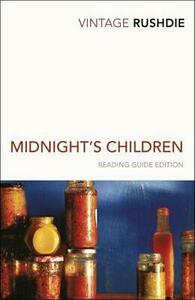Take a photo of a barcode or cover
Je m'attendais à bien mieux que cela lorsque j'ai lu le résumé du livre. Je m'attendais à une critique plus acerbe des régimes politiques de l'Inde. L'auteur aurait peut être mieux fait de rester à une seule période de l'Inde plutôt qu'en prendre aussi large.
Le livre m'a fait penser par moment à Candide de Voltaire mais écrit d'une façon plus décousue. Je vois beaucoup de ressemblance entre Candide et Saleem mais Rushdie n'est pas aussi efficace que Voltaire.
En fait, pour moi ce livre souffre d'un gros problème. C'est celui d'avoir été lu après l'Équilibre du monde de Rohinton Mistry. Sans être mauvais, il n'est pas excellent non plus.
Le livre m'a fait penser par moment à Candide de Voltaire mais écrit d'une façon plus décousue. Je vois beaucoup de ressemblance entre Candide et Saleem mais Rushdie n'est pas aussi efficace que Voltaire.
En fait, pour moi ce livre souffre d'un gros problème. C'est celui d'avoir été lu après l'Équilibre du monde de Rohinton Mistry. Sans être mauvais, il n'est pas excellent non plus.
challenging
reflective
slow-paced
Plot or Character Driven:
A mix
Strong character development:
Yes
Loveable characters:
Complicated
Diverse cast of characters:
Yes
Flaws of characters a main focus:
Yes
adventurous
emotional
informative
reflective
sad
medium-paced
Plot or Character Driven:
A mix
Strong character development:
Yes
Loveable characters:
Complicated
Diverse cast of characters:
Yes
Flaws of characters a main focus:
Yes
So I love so many aspects of this writing style and type of storytelling, but I just couldn't do 800 pages of it. This would have been a delightful 200 pages but it ended feeling like a slog, which disappointed me greatly because I wanted to love it
It took me a long time and many chapters to get in to Midnight's Children, but I was glad that I persevered. In the end, it was fantastic. My advice is to stick with it if the first 100-200 pages seem to be heavy going...
I tried and tried and tried to read this book. I just couldn't do it. Every time I sat down to it I fell asleep.
So as much as I hate to, I give up.
So as much as I hate to, I give up.
Midnight's Children Starts out as one of those books that is so good, that I can't really explain why. In many ways, it defies story telling conventions and yet manages to be extraordinarily captivating. I just want to hear all the vignettes about the Aziz-Sinai family. I am charmed by the self conscious use of language and story telling.
The problem is that for a large stretch of the second half of the book, I wasn't captivated. I didn't care as much.
I have a few ideas why. Maybe this is the kind of book that needs to be read slowly (it is a long! book), taken section by section. Maybe I suffered from overload. On the other hand, I get the feeling that Rushdie might have gotten fatigued; he was writing a long book and wanted to get to the end (where it once again became enthralling), but he couldn't skip over important sections of his main characters biography.
Anyway, as there was a hole that defined many of the characters lives, so I felt there was a hole in this book that made it somewhat less than it could have been.
And one final thought: I know Rushdie is most known for the controversy he caused with Satanic Verses, but I am impressed by the guts that he showed her, almost begging for controversy with his intense criticism of on again off again prime minister Indira Gandhi, who becomes a fictionalized villain in the story; he goes beyond any allegorical criticism of her regime to actually having her oppress the main character and his friends.
The problem is that for a large stretch of the second half of the book, I wasn't captivated. I didn't care as much.
I have a few ideas why. Maybe this is the kind of book that needs to be read slowly (it is a long! book), taken section by section. Maybe I suffered from overload. On the other hand, I get the feeling that Rushdie might have gotten fatigued; he was writing a long book and wanted to get to the end (where it once again became enthralling), but he couldn't skip over important sections of his main characters biography.
Anyway, as there was a hole that defined many of the characters lives, so I felt there was a hole in this book that made it somewhat less than it could have been.
And one final thought: I know Rushdie is most known for the controversy he caused with Satanic Verses, but I am impressed by the guts that he showed her, almost begging for controversy with his intense criticism of on again off again prime minister Indira Gandhi, who becomes a fictionalized villain in the story; he goes beyond any allegorical criticism of her regime to actually having her oppress the main character and his friends.
There is a page 15 club for Rushdie? I made it to 80 and then couldn't do anymore.
A book this jam-packed with language, symbolism, history, and fantasy is hard to sum up. It's the story of Saleem, one of 1,001 children born at midnight when India became independent, all of who gain some kind of unusual skill or power. Saleem's personal history is inextricably intertwined with the history of this new nation, but as India was necessarily influenced by its colonial past, we first get the story of Saleem's family, going back several generations. In this way, the book reminded me of Middlesex, which I loved, but the constant presence of the bizarre and magical reminded me of Everything Is Illuminated, which I enjoyed much less. The themes of genealogy and history would lead me to recommend it to fans of either or both.
The narrative is intentionally not told in a straightforward manner; there are constant foreshadowings, though in language so vague that they provide very little information, similar to the cryptic but ultimately accurate prophecy about Saleem's birth. The narration style became exhausting after a while in such a long book, and the novel's saturation with both Indian words and long, unknown English words meant I had to stop and look things up constantly. But aside from that, the book was ultimately an interesting and rewarding story to read, plus a valuable lesson in the history of India (and Pakistan and Bangladesh).
The narrative is intentionally not told in a straightforward manner; there are constant foreshadowings, though in language so vague that they provide very little information, similar to the cryptic but ultimately accurate prophecy about Saleem's birth. The narration style became exhausting after a while in such a long book, and the novel's saturation with both Indian words and long, unknown English words meant I had to stop and look things up constantly. But aside from that, the book was ultimately an interesting and rewarding story to read, plus a valuable lesson in the history of India (and Pakistan and Bangladesh).








